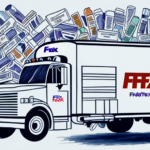Understanding UPS Shipping Rates for Wine from Napa Valley to Chicago
Shipping wine can be a complex process, especially when it comes to understanding the costs associated with it. If you're shipping wine from Napa Valley to Chicago, UPS is one carrier that may come to mind. In this article, we'll explore everything you need to know about UPS shipping rates for wine and how you can save money while ensuring your shipment arrives safely and securely.
The Impact of Distance on UPS Shipping Rates for Wine
Distance is a critical factor that affects UPS shipping rates for wine. The farther your shipment travels, the higher the shipping rate will be. According to UPS's shipping services, rates increase based on the origin and destination zip codes due to varying transportation costs and logistics challenges.
Additionally, shipping from a rural area may cost more than shipping from an urban area because rural locations often have fewer UPS facilities, leading to longer delivery routes and higher transportation expenses. For example, shipping from a remote area in Napa Valley to downtown Chicago will generally be more expensive than shipping within the same metropolitan area.
Understanding the specific origin and destination of your shipment can help you better estimate shipping costs and choose the most cost-effective options.
How to Calculate UPS Shipping Costs for Wine Shipments
Calculating UPS shipping costs for wine shipments involves multiple factors. These include the weight of the package, the dimensions of the box, the distance it's traveling, and the level of service you choose. According to UPS's shipping calculator, you can estimate costs by entering the origin and destination zip codes, package weight and dimensions, and desired service level.
For instance, shipping a 10-pound wine package from Napa Valley to Chicago using UPS Ground might cost approximately $25, while using UPS Next Day Air could increase the cost to around $50. It's essential to consider the fragility of wine bottles, which may require additional packaging materials such as styrofoam inserts or pulp trays. These materials can add to both the weight and dimensions of the package, potentially increasing shipping costs by up to 15%.
Moreover, destination state alcohol laws can impact shipping costs and delivery times. Some states impose restrictions or additional fees for alcohol shipments, so researching the destination state's regulations beforehand is crucial to avoid unexpected expenses or delays.
Factors Affecting the Cost of Shipping Wine with UPS
Several factors influence the cost of shipping wine with UPS:
- Volume of Shipment: Shipping multiple bottles at once can reduce the cost per bottle. For example, shipping a case of 12 bottles may be more economical than shipping individual bottles.
- Type of Packaging: Using sturdy and compact packaging can minimize dimensional weight charges. Packaging that provides adequate protection can also prevent damage, avoiding additional costs from returns or replacements.
- Destination: Shipping to remote or rural areas often incurs higher costs due to longer transportation routes and limited UPS facilities.
- Time of Year: During peak seasons like Christmas or Valentine's Day, shipping rates may surge by up to 20% due to increased demand. Planning shipments during off-peak times can help mitigate these costs.
Understanding these factors allows you to make informed decisions and optimize your shipping strategy for both cost and efficiency.
Tips to Save Money on UPS Shipping Rates for Wine
To save money on UPS shipping rates for wine, consider the following strategies:
- Ship in Bulk: Consolidate multiple bottles into a single shipment to reduce the cost per unit.
- Opt for Standard Shipping: Choose standard shipping options over express services to lower costs.
- Choose Efficient Packaging: Use sturdy yet compact packaging to minimize dimensional weight charges.
- Ship During Off-Peak Times: Avoid peak shipping seasons to take advantage of lower rates.
Additionally, leveraging a third-party shipping service can offer negotiated rates with carriers like UPS, potentially lowering your overall shipping expenses. Proper packaging not only protects your wine but also avoids costly returns and replacements. Consider using foam inserts or bubble wrap to secure the bottles effectively.
The Importance of Proper Packaging for Wine Shipments
Proper packaging is essential when shipping wine with UPS. The packaging must be robust enough to withstand transportation stresses, including temperature fluctuations and rough handling during transit. Investing in specialized wine shipping boxes or protective materials can significantly reduce the risk of damage.
Moreover, accurate labeling is crucial. Packages containing alcohol must be clearly labeled as such and include necessary documentation. This ensures compliance with UPS and customs regulations, preventing delays or confiscation. According to the shipping carriers, failure to properly label and document wine shipments can result in fines and legal consequences.
How to Ensure Safe and Secure Delivery of Wine with UPS
Ensuring the safe and secure delivery of your wine with UPS involves several steps:
- Proper Packaging: Use high-quality packaging materials to protect the bottles from damage.
- Select Appropriate Service Level: Choose a UPS service that includes tracking and insurance coverage for added security.
- Secure Delivery Location: Ensure that someone is available to receive and sign for the package to prevent it from being left unattended.
- Monitor Weather Conditions: Extreme temperatures can damage wine, so check the weather forecast and consider expedited shipping if necessary.
- Communicate with Recipient: Inform the recipient about the expected delivery date and time to ensure they are available to receive the shipment.
By following these steps, you can minimize the risk of damage and ensure that your wine arrives in excellent condition.
Understanding the Legal Requirements for Shipping Wine with UPS
Shipping wine with UPS requires strict adherence to various legal requirements:
- Legal Drinking Age Verification: Ensure the recipient is of legal drinking age in the destination state.
- Compliance with State and Federal Regulations: Different states have unique laws regarding alcohol shipments. For example, some states may require specific permits or limit the quantity of alcohol that can be shipped.
- Proper Labeling: Labels must clearly state "Contains Alcohol" and "Adult Signature Required" to comply with UPS and legal standards.
Failure to comply with these regulations can result in fines, shipment delays, or confiscation of the wine by authorities. It's advisable to consult with a legal expert or a third-party logistics provider familiar with alcohol shipping laws to ensure full compliance.
Additionally, using expedited shipping methods like UPS Next Day Air or UPS 2nd Day Air can help mitigate risks associated with temperature fluctuations and ensure timely delivery.
Common Mistakes to Avoid When Shipping Wine with UPS
When shipping wine with UPS, avoid the following common mistakes to ensure a smooth and cost-effective process:
- Poor Packaging: Inadequate packaging can lead to broken bottles or spoiled wine. Always use high-quality, protective materials.
- Choosing Ineligible Carriers: Not all carriers are authorized to ship alcohol. Ensure UPS is permitted to handle your specific shipment.
- Non-Compliance with Regulations: Skipping the research on state and federal shipping laws can lead to legal issues and shipment confiscation.
- Ignoring Weather Conditions: Extreme temperatures can ruin wine quality. Monitor weather forecasts and adjust shipping methods accordingly.
- Incorrect Labeling: Failing to properly label the package can result in delays or legal penalties.
By recognizing and avoiding these mistakes, you can enhance the reliability and efficiency of your wine shipping process.
Comparing UPS Shipping Rates to Other Carriers for Wine Shipments
When shipping wine, it's essential to compare UPS shipping rates with other carriers like FedEx and GSO to ensure you're getting the best value. Factors to consider include:
- Transit Times: UPS offers a range of shipping speeds. Compare these with FedEx and GSO to find the best fit for your timeline.
- Delivery Locations: Ensure the carrier can deliver to both origin and destination points efficiently.
- Service Levels: Different carriers offer various service tiers. Select one that balances cost and delivery speed.
- Packaging Requirements: Some carriers may have specific packaging guidelines for alcohol, affecting overall shipping costs.
- Legal Compliance: Verify that the carrier complies with alcohol shipping regulations in all relevant jurisdictions.
For example, FedEx might offer more competitive rates for certain routes, while GSO could provide specialized services for wine shipments. Evaluating these aspects can help you choose the most cost-effective and reliable carrier for your needs.
Additionally, consider any negotiated rates or partnerships you may have with third-party logistics providers that could offer discounts across multiple carriers.
How Weather Conditions Affect UPS Shipping Rates for Wine
Weather conditions play a significant role in UPS shipping rates for wine. Extreme temperatures, whether hot or cold, can damage wine during transit, leading carriers like UPS to implement additional fees to manage these risks. According to UPS, shipments exposed to extreme weather may require specialized handling or expedited services to ensure the wine remains in optimal condition.
For instance, during summer months with high temperatures, you might incur higher shipping costs if you choose expedited services to reduce transit time. Conversely, in winter, insulated packaging or temperature-controlled shipping options might be necessary, potentially increasing the overall shipping rate by up to 10-20%.
Planning your shipments around expected weather patterns and selecting appropriate shipping methods can help control costs while protecting the quality of your wine.
Best Practices for Tracking and Monitoring Your Wine Shipment with UPS
Tracking and monitoring your wine shipment with UPS is essential to ensure timely and safe delivery. Here are some best practices:
- Use UPS Tracking Tools: Utilize UPS's online tracking system to monitor the real-time status of your shipment. This allows you to stay informed about any potential delays or issues.
- Set Up Notifications: Enable email or SMS notifications to receive updates on your shipment's progress, including departure, transit, and delivery status.
- Insure Valuable Shipments: Purchase additional insurance for high-value shipments to protect against loss or damage.
- Regularly Check Shipment Status: Periodically review the tracking information to ensure there are no unexpected delays or reroutes.
- Address Verification: Confirm that both the origin and destination addresses are accurate to prevent delivery errors.
By actively monitoring your shipments, you can respond promptly to any issues, ensuring your wine arrives as intended and maintaining the integrity of your supply chain.
The Benefits of Using a Third-Party Logistics Provider for Your Wine Shipments
Using a third-party logistics provider (3PL) for your wine shipments offers several advantages:
- Expertise in Wine Shipping: 3PLs specialize in handling delicate items like wine, providing tailored solutions that general carriers may not offer.
- Negotiated Shipping Rates: 3PLs often have bulk shipping agreements with carriers like UPS, enabling them to secure lower rates for their clients.
- Consolidation Services: By combining multiple shipments, 3PLs can reduce overall shipping costs and improve efficiency.
- Compliance Management: 3PLs stay updated with state and federal regulations regarding alcohol shipping, ensuring your shipments are fully compliant.
- Enhanced Tracking and Reporting: Advanced tracking systems provided by 3PLs offer greater visibility and control over your shipments.
Partnering with a reputable 3PL can streamline your wine shipping process, reduce costs, and ensure reliable delivery, allowing you to focus on other aspects of your business.
Balancing Cost and Time: Choosing the Right UPS Shipping Option for Your Wine
When shipping wine with UPS, balancing cost and time is crucial to selecting the appropriate shipping option. Here are some considerations:
- Express Shipping: Services like UPS Next Day Air provide rapid delivery, minimizing transit time and reducing the risk of temperature-related damage. However, these services are typically more expensive, with costs approximately doubling compared to standard shipping.
- Standard Shipping: UPS Ground offers more economical rates and is suitable for non-urgent shipments. While delivery times are longer, costs can be reduced by up to 50% compared to express options.
- Insured Shipping: Adding insurance to your shipment protects against loss or damage, adding a small percentage to the overall cost but providing peace of mind.
- Consolidated Shipments: Combining multiple shipments into a single package can lower the cost per unit but may extend delivery times.
Assess your budget, delivery timeline, and the specific needs of your shipment to determine the optimal balance between cost and speed. For example, if you need to send wine quickly for a special occasion, an express service might be worth the extra expense. Conversely, for regular shipments, standard shipping offers significant savings.
Navigating International Regulations When Shipping Wine from Napa Valley to Chicago
Shipping wine internationally introduces additional regulations and requirements beyond domestic shipping. Key considerations include:
- Import/Export Licenses: Obtain necessary licenses to legally ship alcohol across international borders. This may involve registering with relevant authorities and adhering to specific documentation standards.
- Customs Fees and Taxes: Be prepared to pay import duties, taxes, and other fees imposed by the destination country. These costs can vary widely based on local laws and the value of the shipment.
- Country-Specific Regulations: Each country has unique requirements for alcohol shipments, including restrictions on alcohol type, quantity, and packaging.
- Packaging Standards: Ensure that your packaging meets the destination country's standards to prevent delays or rejection of the shipment.
Partnering with a 3PL that specializes in international wine shipping can simplify the process by handling licensing, compliance, and logistics. This expertise ensures that your shipments adhere to all regulations, minimizing the risk of delays and additional costs.
Top Considerations When Selecting a Carrier for Your Next Wine Shipment
When selecting a carrier for your next wine shipment, evaluate the following factors to ensure a smooth and cost-effective delivery:
- Shipping Rates and Costs: Compare rates across carriers to find the most competitive pricing without compromising service quality.
- Service Levels and Transit Times: Assess the carrier’s service options to match your delivery timeline needs.
- Insurance Coverage and Tracking Capabilities: Ensure the carrier offers comprehensive insurance and reliable tracking to protect your shipment.
- Experience and Expertise in Shipping Wine: Choose a carrier with a proven track record in handling delicate items like wine, ensuring proper care and handling.
- Compliance with Regulatory Requirements: Verify that the carrier adheres to all relevant state and federal alcohol shipping regulations to avoid legal issues.
By thoroughly evaluating these considerations, you can select the right carrier that aligns with your business needs, ensuring your wine shipments are delivered safely, efficiently, and cost-effectively.






















